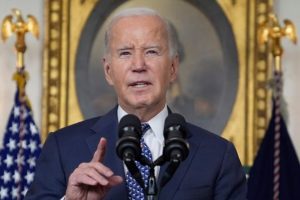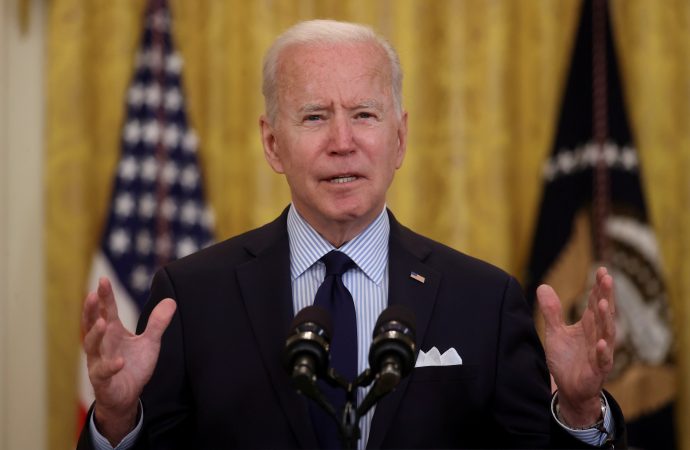As President Joe Biden’s current term approaches the midpoint, speculation about who might replace him as the Democratic nominee for the 2024 presidential election has intensified. Several prominent figures within the Democratic Party are emerging as potential contenders, each with unique qualifications and challenges. This article examines these potential candidates, analyzing their strengths and weaknesses,
As President Joe Biden’s current term approaches the midpoint, speculation about who might replace him as the Democratic nominee for the 2024 presidential election has intensified. Several prominent figures within the Democratic Party are emerging as potential contenders, each with unique qualifications and challenges. This article examines these potential candidates, analyzing their strengths and weaknesses, and provides a comparative overview to assess who might be the most viable alternative to Biden.
1. The Landscape of Democratic Contenders

This image is taken from google.com
The Democratic Party faces a critical decision as it considers who could potentially lead the party in the 2024 presidential race. Given Biden’s age and approval ratings, several high-profile Democrats have started to position themselves as viable alternatives. The landscape includes current officeholders, former officials, and influential party members who could reshape the future of American politics.
2. Potential Contenders
2.1 Kamala Harris
Background: As the current Vice President of the United States, Kamala Harris brings a wealth of experience in both legislative and executive branches. Before becoming Vice President, she served as a U.S. Senator from California and as the Attorney General of California.
Strengths:
- Experience: Extensive experience in both state and federal government roles.
- Diversity: Represents a significant milestone in terms of race and gender, appealing to a broad base of voters.
- High Profile: Already a well-known figure with a substantial platform.
Weaknesses:
- Approval Ratings: Struggles with lower approval ratings and public perception issues.
- Challenges: Has faced criticism for her handling of certain issues and perceived lack of strong leadership in key areas.
2.2 Gavin Newsom
Background: Gavin Newsom, the Governor of California, has gained national prominence through his handling of state issues and his stance on progressive policies. His leadership during the COVID-19 pandemic and his progressive policies on climate change and healthcare have drawn significant attention.
Strengths:
- Progressive Policies: Strong track record on progressive issues which resonate with the Democratic base.
- National Profile: Gained visibility and experience on the national stage, which could be beneficial for a presidential run.
- Campaign Experience: Proven ability to manage and execute political campaigns effectively.
Weaknesses:
- State Issues: Criticized for handling of certain state issues, including homelessness and housing affordability.
- Polarization: His progressive stances may not appeal to moderate Democrats or independents.
2.3 Elizabeth Warren
Background: Senator Elizabeth Warren from Massachusetts is known for her focus on economic inequality and consumer protection. Her progressive platform and detailed policy proposals have earned her a significant following among progressive Democrats.
Strengths:
- Policy Expertise: Deep knowledge of economic issues and a track record of advocating for comprehensive reforms.
- Grassroots Support: Strong support from progressive grassroots organizations and activists.
- Senate Experience: Extensive experience in legislation and policy advocacy.
Weaknesses:
- Electability Concerns: Faces questions about her electability in a general election, especially in swing states.
- Progressive Label: May face challenges in appealing to moderate voters due to her progressive stances.
2.4 Pete Buttigieg
Background: Pete Buttigieg, the Secretary of Transportation and former Mayor of South Bend, Indiana, made a notable impression during the 2020 Democratic primaries. His youth and experience in both local and federal government positions have positioned him as a rising star in the party.
Strengths:
- Youthful Appeal: Represents a new generation of leadership with a focus on modernization and infrastructure.
- Technical Expertise: Significant experience in managing complex projects and understanding of transportation issues.
- Broad Appeal: Potential to attract younger voters and moderate Democrats.
Weaknesses:
- Limited National Experience: While experienced, his national experience is limited compared to other contenders.
- Challenges in Leadership: Faces scrutiny over his performance as Secretary of Transportation and his ability to handle large-scale issues.
3. Comparative Analysis
To better understand how these potential candidates stack up against each other, a comparative table is presented below, highlighting their key attributes and potential challenges.
| Candidate | Experience | Strengths | Weaknesses | Electability |
|---|---|---|---|---|
| Kamala Harris | Vice President, U.S. Senator, Attorney General | High profile, experience in federal government, diversity | Lower approval ratings, public perception issues | Mixed, with challenges among moderate voters |
| Gavin Newsom | Governor of California | Progressive policies, national visibility, campaign experience | Criticism on state issues, progressive polarization | Potentially strong among progressives, but mixed among moderates |
| Elizabeth Warren | U.S. Senator | Policy expertise, grassroots support, economic focus | Electability concerns, progressive label issues | Strong among progressives, but challenges with moderates and swing voters |
| Pete Buttigieg | Secretary of Transportation, Former Mayor | Youthful appeal, technical expertise, broad appeal | Limited national experience, performance scrutiny | Strong appeal to younger voters, but mixed with more experienced Democrats |
4. Conclusion
The question of who could replace Joe Biden in the 2024 presidential election presents a complex scenario with several promising Democratic contenders. Kamala Harris, Gavin Newsom, Elizabeth Warren, and Pete Buttigieg each bring unique strengths and face specific challenges.
Harris has the advantage of high-profile experience but struggles with approval ratings. Newsom’s progressive credentials and campaign experience make him a formidable candidate, though he may face challenges with moderates. Warren’s policy expertise and grassroots support are significant assets, but her progressive positions could impact her general election appeal. Buttigieg’s youthful and technical appeal positions him well for future leadership, but his national experience and performance are under scrutiny.
Ultimately, the Democratic Party will need to weigh these factors carefully as it considers the best candidate to lead the party into the 2024 election and beyond.
















